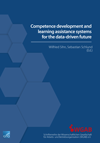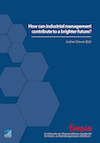Search


Bibtex
Cite as text
@Article{,
Year= "2021",
Volume= "Schriftenreihe der Wissenschaftlichen Gesellschaft für Arbeits- und Betriebsorganisation (WGAB) e.V.",
Pages= "179-198",
Journal = "WGAB",
Title= "Towards a maturity model of human-centered AI – A reference for AI implementation at the workplace ",
Author= "Prof. Dr. Uta Wilkens
Institute of Labor Science
Chair for Work, Human Resources and Leadership Ruhr-Universität Bochum
Valentin Langholf (M.Sc.)
Institute of Labor Science
Chair for Work, Human Resources and Leadership Ruhr-Universität Bochum
Greta Ontrup (M.Sc.)
Department of Work and Organizational Psychology Faculty of Psychology
Ruhr-Universität Bochum
Prof. Dr. Annette Kluge
Department of Work and Organizational Psychology Faculty of Psychology
Ruhr-Universität Bochum
",
Doi= "https://doi.org/10.30844/wgab_2021_11",
Abstract= "In our paper we present first performance measurement results of a digital simulation laboratory, which is applied in the context of industrial front-end team training. The design of the simulation laboratory is oriented towards an Escape Room. First, we situate the presented approach within existing competency understandings and accompanying training approaches in the context of Industry 4.0 Performance measurement for front-end training has been a challenge in this context so far, since performance, unlike in the back-end, is not attributable to specific production results, but becomes visible on a superior process level. Building on the competency facets of complexity management, self-reflection, creative problem solving, and cooperation (Wilkens et al., 2017) as well as action implementation (Heyse & Erpenbeck, 2009), the performance measurement presented addresses the question which individual competencies have an impact on team performance in the simulation scenario. Preliminary results show that the individual competencies among team members have a lower impact on performance than moderating factors such as heterogeneity and cohesion within the team. In order to increase the performance of front-end teams, it therefore appears to be reasonable to focus more on developing team structures rather than only on individual competence development. ",
}
Prof. Dr. Uta Wilkens
Institute of Labor Science
Chair for Work, Human Resources and Leadership Ruhr-Universität Bochum
Valentin Langholf (M.Sc.)
Institute of Labor Science
Chair for Work, Human Resources and Leadership Ruhr-Universität Bochum
Greta Ontrup (M.Sc.)
Department of Work and Organizational Psychology Faculty of Psychology
Ruhr-Universität Bochum
Prof. Dr. Annette Kluge
Department of Work and Organizational Psychology Faculty of Psychology
Ruhr-Universität Bochum(2021): Towards a maturity model of human-centered AI – A reference for AI implementation at the workplace . Schriftenreihe der Wissenschaftlichen Gesellschaft für Arbeits- und Betriebsorganisation (WGAB) e.V.(2021), S. 179-198. Online: https://doi.org/10.30844/wgab_2021_11 (Abgerufen 24.02.26)
Open Access
Abstract
Abstract
In our paper we present first performance measurement results of a digital simulation laboratory, which is applied in the context of industrial front-end team training. The design of the simulation laboratory is oriented towards an Escape Room. First, we situate the presented approach within existing competency understandings and accompanying training approaches in the context of Industry 4.0 Performance measurement for front-end training has been a challenge in this context so far, since performance, unlike in the back-end, is not attributable to specific production results, but becomes visible on a superior process level. Building on the competency facets of complexity management, self-reflection, creative problem solving, and cooperation (Wilkens et al., 2017) as well as action implementation (Heyse & Erpenbeck, 2009), the performance measurement presented addresses the question which individual competencies have an impact on team performance in the simulation scenario. Preliminary results show that the individual competencies among team members have a lower impact on performance than moderating factors such as heterogeneity and cohesion within the team. In order to increase the performance of front-end teams, it therefore appears to be reasonable to focus more on developing team structures rather than only on individual competence development.
Keywords
Schlüsselwörter
References
Referenzen
.

 Deutsch
Deutsch
